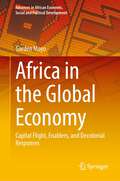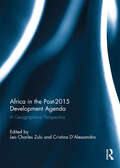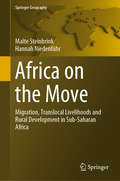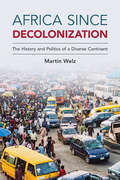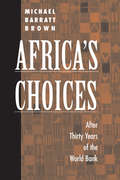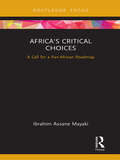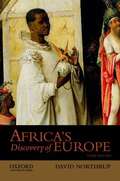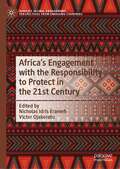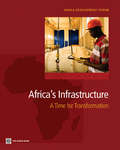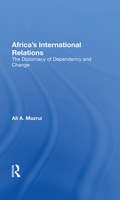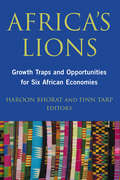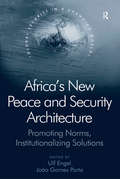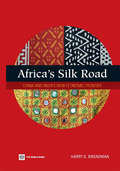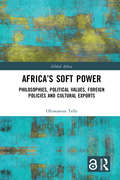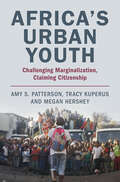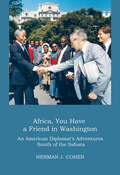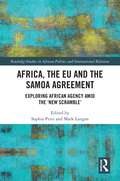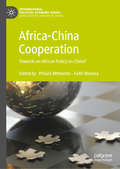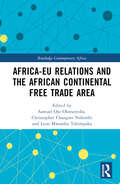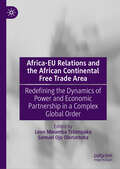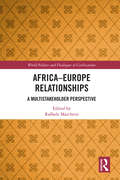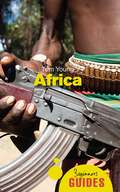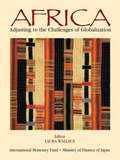- Table View
- List View
Africa in the Global Economy: Capital Flight, Enablers, and Decolonial Responses (Advances in African Economic, Social and Political Development)
by Gorden MoyoThis book discusses the role played by powerful global institutions such as the IMF, the World Bank, the World Trade Organisation, multinational corporations, and the international credit rating agencies in keeping Africa marginalised in the world economy. The book focuses on the intrusive roles of these institutions as enablers and beneficiaries of capital outflows and financial subordination in Africa. Diverging from the official narrative that touts China and the other emerging economies as global reformers that are poised to partner Africa in its fight against financial subjugation, the book instead argues that, like the Western powers, the emerging economies are benefiting prodigiously from a rigged global financial system that keeps Africa as a net creditor to the rest of the world. The book draws its theoretical framework from the repressed heterodox theories including dependency, core-periphery, world systems and Marxist theories as well as the decolonial approach. It concludes with a call for a decolonial African agency that should champion an epistemic rebellion against the neo-liberal and neo-classic economic traditions that have been historically deployed to justify Africa’s subordinated position in the global economic governance. This book comes at moment in time when Africa is ready to become a Rule Maker not a Rule Taker. The analysis Dr. Moyo presents having been in the front line of public policy and international negotiations demonstrate the need for Africa to re-write the rules to foster our own Transformation. Jason Rosario Braganza, Executive Director, African Forum and Network on Debt and Development (AFRODAD)
Africa in the Post-2015 Development Agenda: A Geographical Perspective
by Leo Charles Zulu and Cristina D’AlessandroThis book offers a multifaceted examination of Africa’s development into the post-2015 global agenda from a geographical perspective. As a diversified and highly applied discipline, geography has a lot to offer to global debates, nuanced analysis of problems on and the search for innovative solutions to advance the African development agenda beyond 2015. The end of the Millennium Development Goals (MDGs) era and the launch of the Sustainable Development Goals (SDGs) in September 2015 mark an important turning point for Africa and an opportune time to examine new challenges and opportunities that it faces. The regional disparities in MDG progress affirm an important geographic tenet that the unique yet internally differentiated socio-cultural, economic, political, ecological, biophysical and historical context give Africa distinctive challenges and opportunities that demand particular approaches to development. This edited book presents innovative contributions examining Africa’s development performance in diverse sectors during the MDG era as a basis for understanding prospects for its development in the SDG era and beyond. It offers new and innovative study perspectives and methodological approaches on urban transformation, development financing, food security, climate change, gender equality, health, and regional integration, among other topics, and useful insights for scholars, students and development practitioners. This book was originally published as a special issue of African Geographical Review, the journal of the American Association of Geographers’ Africa Specialty Group, to mark the transition from MDGs to SDGs.
Africa in the World: Capitalism, Empire, Nation-State
by Frederick CooperAt the Second World War's end, it was clear that business as usual in colonized Africa would not resume. W. E. B. Du Bois's The World and Africa, published in 1946, recognized the depth of the crisis that the war had brought to Europe, and hence to Europe's domination over much of the globe. Du Bois believed that Africa's past provided lessons for its future, for international statecraft, and for humanity's mastery of social relations and commerce. Frederick Cooper revisits a history in which Africans were both empire-builders and the objects of colonization, and participants in the events that gave rise to global capitalism. Of the many pathways out of empire that African leaders envisioned in the 1940s and 1950s, Cooper asks why they ultimately followed the one that led to the nation-state, a political form whose limitations and dangers were recognized by influential Africans at the time. Cooper takes account of the central fact of Africa's situation--extreme inequality between Africa and the western world, and extreme inequality within African societies--and considers the implications of this past trajectory for the future. Reflecting on the vast body of research on Africa since Du Bois's time, Cooper corrects outdated perceptions of a continent often relegated to the margins of world history and integrates its experience into the mainstream of global affairs.
Africa on the Move: Migration, Translocal Livelihoods and Rural Development in Sub-Saharan Africa (Springer Geography)
by Malte Steinbrink Hannah NiedenführThis book discusses migration and space-spanning social network relationships as normal realities of life in African societies. It offers an overview of the research landscape and introduces an agency-centered theoretical model that provides a conceptual framework for translocality. The authors Malte Steinbrink and Hannah Niedenführ plead for a translocal approach to social transformation, showing how the translocality of livelihoods is shaping the lives of half a billion people on the continent and impacting local conditions. Using an action-oriented approach, the book analyzes the effects of translocal livelihoods on diverse aspects of economic, environmental and social change in rural Sub-Saharan Africa. The study thus makes an innovative contribution not only to migration research and development studies but also to the discussion around the policy and practice of development cooperation and planning. It is time to rethink development in light of translocal realities. The book appeals to scholars and researchers in geography, sociology, policy-making and planning, development studies, migration research and rural development.
Africa since Decolonization: The History and Politics of a Diverse Continent
by Martin WelzHome to more than 1.2 billion people, living in 54 recognized states, speaking around 3,000 languages, Africa is a diverse and complex continent made up of states which differ in regard to their colonial history, political system, socio-economic development, economic polices and their experience with crises and conflicts. This introduction and overview of African history and politics since decolonization emphasises throughout, the diversity of the continent. Organised thematically to include chapters on decolonization and its legacies, external influences, economics, political systems, inter-African relations, crises, conflicts and conflict management, and Africa's external relations, Martin Welz strikes a fine balance between the use of contextual information, analysis, case studies and examples with theoretical debates in development, politics and global policy. Accessible to students at all levels, it counters histories which offer reductive explanations of complex issues, and offers new insights into the role African actors have played in influencing international affairs beyond the continent.
Africa's Choices: After Thirty Years Of The World Bank
by Michael Barratt BrownThis book provides an account of actual African experience and African criticisms. It is designed to examine the actual viability of the World Bank's structural adjustment strategies for Africa, all of which were designed to encourage export-led growth.
Africa's Critical Choices: A Call for a Pan-African Roadmap (Europa Regional Perspectives)
by Dunod EditeurThis volume examines contemporary Africa, a vast continent which, while entering the era of globalization, is also confronted by a number of issues, including the environment and climate change, demographics, trade issues, internal and external migration, education, economic Issues, governance, and the influence of other countries. Written by former Prime Minister of Niger and current Chief Executive Officer of the Secretariat of the New Partnership for Africa’s Development (NEPAD), Dr Ibrahim Assane Mayaki, this book offers an overview of Africa, and looks to the next generation of leaders in the continent, aiming to offer a manifesto for future change.
Africa's Development in Historical Perspective
by James A. Robinson Robert H. Bates Emmanuel Akyeampong Robert H. Bates Nathan Nunn Emmanuel Akyeampong Nathan NunnThis edited volume addresses the root causes of Africa's persistent poverty through an investigation of its longue durée history. It interrogates the African past through disease and demography, institutions and governance, African economies and the impact of the export slave trade, colonialism, Africa in the world economy, and culture's influence on accumulation and investment. Several of the chapters take a comparative perspective, placing Africa's developments aside other global patterns. The readership for this book spans from the informed lay reader with an interest in Africa, academics and undergraduate and graduate students, policy makers, and those in the development world.
Africa's Discovery of Europe (Third Edition)
by David NorthrupThis groundbreaking book examines the full range of African-European encounters from an unfamiliar African perspective rather than from the customary European one. By featuring vivid life stories of individual Africans and drawing upon their many recorded sentiments, David Northrup presentsAfrican perspectives that persuasively challenge stereotypes about African-European relations as they unfolded in Africa, Europe, and the Atlantic world between 1450 and 1850. The text features thematically organized chapters that explore first impressions, religion and politics, commerce and culture, imported goods and technology, the Middle Passage, and Africans in Europe. In addition, Northrup offers a thoughtful examination of Africans' relations - intellectual,commercial, cultural, and sexual - with Europeans, tracing how the patterns of behavior that emerged from these encounters shaped pre-colonial Africa. The book concludes with an examination of the roles of race, class, and culture in early modern times, pointing out which themes in Africa'scontinuing discovery of Europe after 1850 were similar to earlier patterns, and why other themes were different.
Africa's Engagement with the Responsibility to Protect in the 21st Century (Africa's Global Engagement: Perspectives from Emerging Countries)
by Victor Ojakorotu Nicholas Idris EramehThis book sheds light on the practice, challenges, and prospects of the Responsibility to Protect (RtoP) amidst wide contestation, backlash, operational challenges, and expectation gaps associated with the theory and practice of the RtoP. Diverging from existing works, it provides a renewed perspective and alternatives for future deployment of the RtoP and critical insights to the readers on how issues such as support, consolidation, and institutionalization within the broader context of regional dynamics of the RtoP can be best achieved in Africa. The book will be of particular interest to diplomats, international relations experts, scholars, RtoP advocates, the United Nations, and the African Union.
Africa's Infrastructure: A Time for Transformation
by World BankSustainable infrastructure development is vital for Africa's prosperity. And now is the time to begin the transformation. This volume is the culmination of an unprecedented effort to document, analyze, and interpret the full extent of the challenge in developing Sub-Saharan Africa's infrastructure sectors. As a result, it represents the most comprehensive reference currently available on infrastructure in the region. The book covers the five main economic infrastructure sectors-information and communication technology, irrigation, power, transport, and water and sanitation. 'Africa's Infrastructure: A Time for Transformation' reflects the collaboration of a wide array of African regional institutions and development partners under the auspices of the Infrastructure Consortium for Africa. It presents the findings of the Africa Infrastructure Country Diagnostic (AICD), a project launched following a commitment in 2005 by the international community (after the G8 summit at Gleneagles, Scotland) to scale up financial support for infrastructure development in Africa. The lack of reliable information in this area made it difficult to evaluate the success of past interventions, prioritize current allocations, and provide benchmarks for measuring future progress, hence the need for the AICD. Africa's infrastructure sectors lag well behind those of the rest of the world, and the gap is widening. Some of the main-policy-relevant-findings highlighted in the book include the following: infrastructure in the region is exceptionally expensive, with tariffs being many times higher than those found elsewhere. Inadequate and expensive infrastructure is retarding growth by 2 percentage points each year. Solving the problem will cost over US$90 billion per year, which is more than twice what is being spent in Africa today. However, money alone is not the answer. Prudent policies, wise management, and sound maintenance can improve efficiency, thereby stretching the infrastructure dollar. There is the potential to recover an additional US$17 billion a year from within the existing infrastructure resource envelope-simply by improving efficiency. For example, improved revenue collection and utility management could generate US$3.3 billion per year. Regional power trade could reduce annual costs by US$2 billion. And deregulating the trucking industry could reduce freight costs by one-half. So, raising more funds without also tackling inefficiencies would be like pouring water into a leaking bucket. Finally, the power sector and fragile states represent particular challenges. Even if every efficiency in every infrastructure sector could be captured, a substantial funding gap of $31 billion a year would remain. Nevertheless, the African people and economies cannot wait any longer. Now is the time to begin the transformation to sustainable development.
Africa's International Relations: The Diplomacy Of Dependency And Change
by Ali A MazruiThe author presents a journey through African and Western history, culture and politics. By essaying Africa's international relations, Mazrui returns to an important truth: the power of race and culture in Africa's relations with the West. Discussing African political formation, his overriding theme, not unpredictably, is assimilation - of the enti
Africa's Lions: Growth Traps and Opportunities for Six African Economies
by Finn Tarp Haroon BhoratExamining the economic forces that will shape Africa's future.Africa's Lions examines the economic growth experiences of six fast growing and/or economically dominant African countries. Expert African researchers offer unique perspectives into the challenges and issues in Ethiopia, Ghana, Kenya, Mozambique, Nigeria, and South Africa.Despite a growing body of research on African economies, very little has focused on the relationship between economic growth and employment outcomes at the detailed country level. A lack of empirical data has deprived policymakers of a robust evidence base on which to make informed decisions. By harnessing country-level household, firm, and national accounts data together with existing analytical country research-the authors have attempted to bridge this gap.The growth of the global working-age population to 2030 will be driven primarily by Africa, which means that the relationship between growth and employment should be understood within the context of each country's projected demographic challenge and the associated implications for employment growth. A better understanding of the structure of each country's workforce and the resulting implications for human capital development, the vulnerably employed, and the working poor, will be critical to informing the development policy agenda.As a group, the six countries profiled in Africa's Lions will largely shape the continent's future. Each country chapter focuses on the complex interactions between economic growth and employment outcomes, within the individual Africa's Lions context.
Africa's New Peace and Security Architecture: Promoting Norms, Institutionalizing Solutions (Global Security in a Changing World)
by J. Gomes PortoThis volume offers an informed and critical analysis of the operationalization and institutionalization of the peace and security architecture by the African Union and Africa's Regional Economic Communities (RECs). In creating this architecture, the African Union and the RECs tread new ground with potentially significant consequences to the lives and livelihoods of millions of Africans who are affected by war and armed conflict. In-depth, critical chapters inform, clarify and provide key points for reflection on the architecture as a whole as well as on each of the structures currently under implementation. The volume examines the institutions that will carry the mandate forward, raises pertinent research questions for the successful operationalization of the architecture and debates the medium and long-term challenges to implementation. Students and researchers of African approaches to peace building, conflict resolution and regional security will benefit from the deep and critical engagement of issues covered in this volume by world renowned scholars and practitioners.
Africa's Silk Road: China and India's New Economic Frontier
by Harry G. BroadmanChina and India's new-found interest in trade and investment with Africa - home to 300 million of the globe's poorest people and the world's most formidable development challenge - presents a significant opportunity for growth and integration of the Sub-Saharan continent into the global economy. Africa's Silk Road finds that China and India's South-South commerce with Africa is about far more than natural resources, opening the way for Africa to become a processor of commodities and a competitive supplier of goods and services to these countries - a major departure from its long established relations with the North. A growing number of Chinese and Indian businesses active in Africa operate on a global scale, work with world-class technologies, produce products and services according to the most demanding standards, and foster the integration of African businesses into advanced markets.There are significant imbalances, however, in these emerging commercial relationships. These can be addressed through a series of reforms in all countries: 'At-the-border' reforms, such as elimination of China and India's escalating tariffs on Africa's leading exports, and elimination of Africa's tariffs on certain inputs that make exports uncompetitive 'Behind-the-border' reforms in Africa, to unleash competitive market forces and strengthen its basic market institutions 'Between-the-border' improvements in trade facilitation mechanisms to decrease transactions costs Reforms that leverage linkages between investment and trade, to allow African businesses to participate in global production networks that investments by Chinese and Indian firms can generate.
Africa's Soft Power: Philosophies, Political Values, Foreign Policies and Cultural Exports (Global Africa)
by Oluwaseun TellaThis book investigates the ways in which soft power is used by African countries to help drive global influence. Selecting four of the countries most associated with soft power across the continent, this book delves into the currencies of soft power across the region: from South Africa’s progressive constitution and expanding multinational corporations, to Nigeria’s Nollywood film industry and Technical Aid Corps (TAC) scheme, Kenya’s sport diplomacy, fashion and tourism industries, and finally Egypt’s Pan-Arabism and its reputation as the cradle of civilisation. The book asks how soft power is wielded by these countries and what constraints and contradictions they encounter. Understandings of soft power have typically been driven by Western scholars, but throughout this book, Oluwaseun Tella aims to Africanise our understanding of soft power, drawing on prominent African philosophies, including Nigeria’s Omolúwàbí, South Africa’s Ubuntu, Kenya’s Harambee, and Egypt’s Pharaonism. This book will be of interest to researchers from across political science, international relations, cultural studies, foreign policy and African Studies.
Africa's Urban Youth: Challenging Marginalization, Claiming Citizenship
by Amy S. Patterson Tracy Kuperus Megan HersheyMaking up 65 percent of Africa's population, young people between the ages of 18 and 35 play a key role in politics, yet they live in an environment of rapid urbanization, high unemployment rates and poor state services. Drawing from extensive fieldwork in Ghana, Uganda and Tanzania, this book investigates how Africa's urban youth cultivate a sense of citizenship in this challenging environment, and what it means to them to be a 'good citizen'. In interviews and focus group discussions, African youth, activists, and community leaders vividly explain how income, religion, and gender intertwine with their sense of citizenship and belonging. Though Africa's urban youth face economic and political marginalization as well as generational tensions, they craft a creative citizenship identity that is rooted in their relationships and obligations both to each other and the state. Privileging above all the voice and agency of Africa's young people, this is a vital, systematic examination of youth and youth citizenship in urban environments across Africa.
Africa, You Have a Friend in Washington: An American Diplomat's Adventures South of the Sahara
by Herman J. CohenDuring nineteen years of overseas duty in the Foreign Service, the author served in five U.S. embassies in Africa, including a term as ambassador to the Republic of Senegal. The book highlights the author’s experiences south of the Sahara, both as Foreign Service officer and as assistant secretary of state for Africa in the George H. W. Bush administration. It is a source of useful information for American university students or recent graduates who are considering pursuing careers in the international sector.
Africa, the EU and the Samoa Agreement: Exploring African Agency Amid the ‘New Scramble’ (Routledge Studies in African Politics and International Relations)
by Mark Langan Sophia PriceThis edited volume provides a timely and critical analysis of Africa‑EU Relations in the new Samoa Agreement phase of the long‑standing ‘Eurafrican’ relationship.Drawing on a range of critical perspectives and contributions it moves beyond Eurocentric visions of policy co‑operation on development to highlight three core themes that frame the analysis within this volume: the new scramble for Africa, Europe’s ontological security and the securitisation of development and African agency. In doing so, it assesses EU actors’ engagement with African institutions in relation to key areas of policy collaboration, including trade, development, health, migration and security. In this context, it examines whether the ‘partnership’ offers African states and regional institutions a genuine pathway to ‘development’ or whether historical power asymmetries remain entrenched – and perhaps even exacerbated – through the new Africa‑EU Agreement.This book will be of key interest to scholars, students and practitioners involved in Development Studies, EU studies, Africa‑EU Relations, African politics and International Relations and more broadly to International Political Economy and Comparative Regionalism.
Africa-China Cooperation: Towards an African Policy on China? (International Political Economy Series)
by Philani Mthembu Faith MaberaThis book offers a range of perspectives on the Africa–China partnership in the context of the Forum on China and Africa Cooperation (FOCAC). Incorporating historical, political, social and cultural dimensions, it offers innovative views on the Africa–China relationship that combine theory and practice, and critically examines the prospects of a Pan-African policy towards China, complementary to China’s comprehensive African policy. The chapters address a number of key questions, including: What steps are being taken to achieve a more coordinated approach and policy towards China on the African continent? Does Africa even need a collective strategy in the first place? How would a coherent policy framework affect Africa’s relations with Europe and other external partners? How do the pillars of the partnership align with the African Union’s Agenda 2063 and the United Nation’s 2030 Agenda for Sustainable Development?
Africa-EU Relations and the African Continental Free Trade Area (Routledge Contemporary Africa)
by Samuel Ojo Oloruntoba, Christopher Changwe Nshimbi and Leon Mwamba TshimpakaThis book explores relations between states in the Africa–European Union in view of the African Continental Free Trade Area, both at a regional level and as a series of informal processes of socioeconomic and political interactions between state and non-state actors. The book reconsiders the ways in which actors in the Africa–European Union relationship function, and what that means for regionalism, regionalisation and regional integration. In addition to formalised state-to-state and inter-regional interactions, the book examines the impact of socio-economic and political interactions with non-state actors, including those who engage with regional integration through formal and informal processes such as civil society activists, “African migration evangelists”, human smugglers and human traffickers. The book thus demonstrates that regional and inter-regional engagements include issues that extend beyond the usual discussions of trade. The book is authored from an African perspective and will be of interest to academics who specialise in International Relations, Political Economy, Political Sociology and African Studies. Policy makers and various actors in civil society and think tanks who have an academic inclination and deal with trade, migration and regionalism in Africa and Africa’s relations with Europe will also find the book beneficial.
Africa-EU Relations and the African Continental Free Trade Area: Redefining the Dynamics of Power and Economic Partnership in a Complex Global Order
by Samuel Ojo Oloruntoba Leon Mwamba TshimpakaThis book examines the establishment and implementation of the AfCFTA, which is the largest free trade area globally, covering 54 African countries. It explores how this initiative has the potential to reshape Africa-EU relations by promoting intra-African trade, economic integration, and diversification, as well as inter- regional trade. Both continents have potential to serve as global actors in reshaping the global order in ways that can affect how multilateralism foster inclusive development. However, whether this will happen would be a function of how the EU and AU define their interests and relationship.
Africa-Europe Relationships: A Multistakeholder Perspective (World Politics and Dialogues of Civilizations)
by Raffaele MarchettiThe relationships between Africa and Europe are of high strategic importance. This volume studies the ongoing dynamics between the two continents by adopting a pluralist understanding of international relations which encompasses non-state actors as well as states. Going beyond pure intergovernmentalism, this focus of this book is on activists, business people, religious believers, local politicians as well as transnational networks and by hybrid coalitions. Such plurality of socio-economic and political interactions underpinning the relationship between Africa and Europe is underexamined and yet of great importance. The text identifies new patterns of cooperation and recurrent obstacles in the African-European multistakeholder dynamics, thus opening the way for a more accurate understanding of the future relationship between Africa and Europe. This book brings African and European reflections together, on an equal standing, in order to achieve a true dialogue among civilizations. This book is aimed at all those who are interested in African-European relationships, including students and researchers, as well as activists, business people, civil servant and functionaries at local and national level.
Africa: A Beginner's Guide (Beginner's Guides)
by Tom YoungVast, diverse, dynamic, and turbulent, the true nature of Africa is often obscured by its poverty-stricken image. In this controversial guide, Tom Young cuts through the emotional hype to critically analyse the continent's political history and the factors behind its dismal economic performance. Maintaining that colonial influences are often overplayed, Young argues that much blame must lie with African governments themselves and that Western aid has often caused more harm than good.
